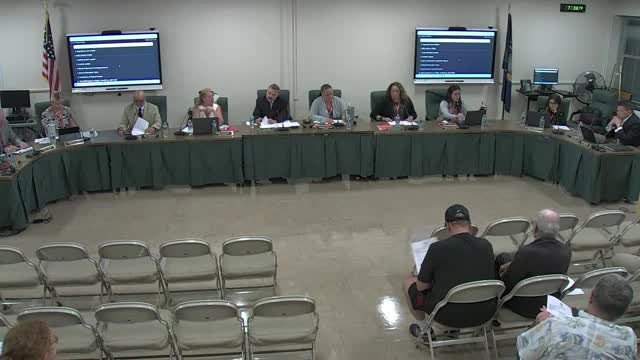School Board Faces Controversy Over Student Transition Policies
August 27, 2024 | CONNETQUOT CENTRAL SCHOOL DISTRICT, School Districts, New York
This article was created by AI summarizing key points discussed. AI makes mistakes, so for full details and context, please refer to the video of the full meeting. Please report any errors so we can fix them. Report an error »

During a recent school board meeting, significant discussions centered around the guidance from the New York State Education Department (NYSED) regarding the social transition of transgender students, particularly the implications for parental notification. Concerns were raised about a policy that allows students to transition without parental knowledge, which some board members argued could place undue pressure on teachers and school staff.
One board member expressed strong opposition to the guidance, emphasizing that parents should be informed about their child's decision to socially transition. The member questioned the role of the school in such situations, seeking clarity on whether the existing guidance from NYSED would mandate schools to support a student's transition without notifying parents. The response highlighted that while the guidance is student-centered, focusing on the safety and acceptance of the child, it does not impose a mandatory requirement for parental notification. Instead, it allows for case-by-case evaluations based on the child's home environment and potential risks.
The superintendent reiterated that the district's approach would prioritize the health and safety of students, acknowledging the complexities involved in handling such sensitive matters. The discussion underscored the distinction between policy and practice, with the board emphasizing the importance of parental involvement while also recognizing the need for discretion in potentially harmful situations.
In addition to the discussions on transgender policies, the board addressed procedural matters regarding the adoption of policies, including a recent vote on a non-discrimination policy that was amended to include all students. The board members engaged in a debate about the proper protocols for seeking legal guidance, with some expressing concerns over transparency and collaboration among board members.
The meeting concluded with a motion to adopt the amended non-discrimination policy, which passed with a majority vote, reflecting the board's commitment to ensuring a safe and inclusive environment for all students. The discussions highlighted ongoing tensions between parental rights, student safety, and the responsibilities of educators in navigating these complex issues.
One board member expressed strong opposition to the guidance, emphasizing that parents should be informed about their child's decision to socially transition. The member questioned the role of the school in such situations, seeking clarity on whether the existing guidance from NYSED would mandate schools to support a student's transition without notifying parents. The response highlighted that while the guidance is student-centered, focusing on the safety and acceptance of the child, it does not impose a mandatory requirement for parental notification. Instead, it allows for case-by-case evaluations based on the child's home environment and potential risks.
The superintendent reiterated that the district's approach would prioritize the health and safety of students, acknowledging the complexities involved in handling such sensitive matters. The discussion underscored the distinction between policy and practice, with the board emphasizing the importance of parental involvement while also recognizing the need for discretion in potentially harmful situations.
In addition to the discussions on transgender policies, the board addressed procedural matters regarding the adoption of policies, including a recent vote on a non-discrimination policy that was amended to include all students. The board members engaged in a debate about the proper protocols for seeking legal guidance, with some expressing concerns over transparency and collaboration among board members.
The meeting concluded with a motion to adopt the amended non-discrimination policy, which passed with a majority vote, reflecting the board's commitment to ensuring a safe and inclusive environment for all students. The discussions highlighted ongoing tensions between parental rights, student safety, and the responsibilities of educators in navigating these complex issues.
View full meeting
This article is based on a recent meeting—watch the full video and explore the complete transcript for deeper insights into the discussion.
View full meeting
